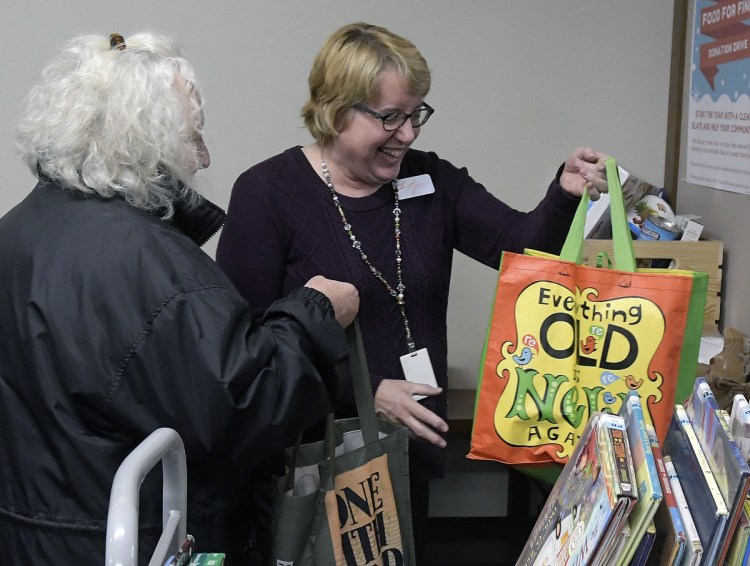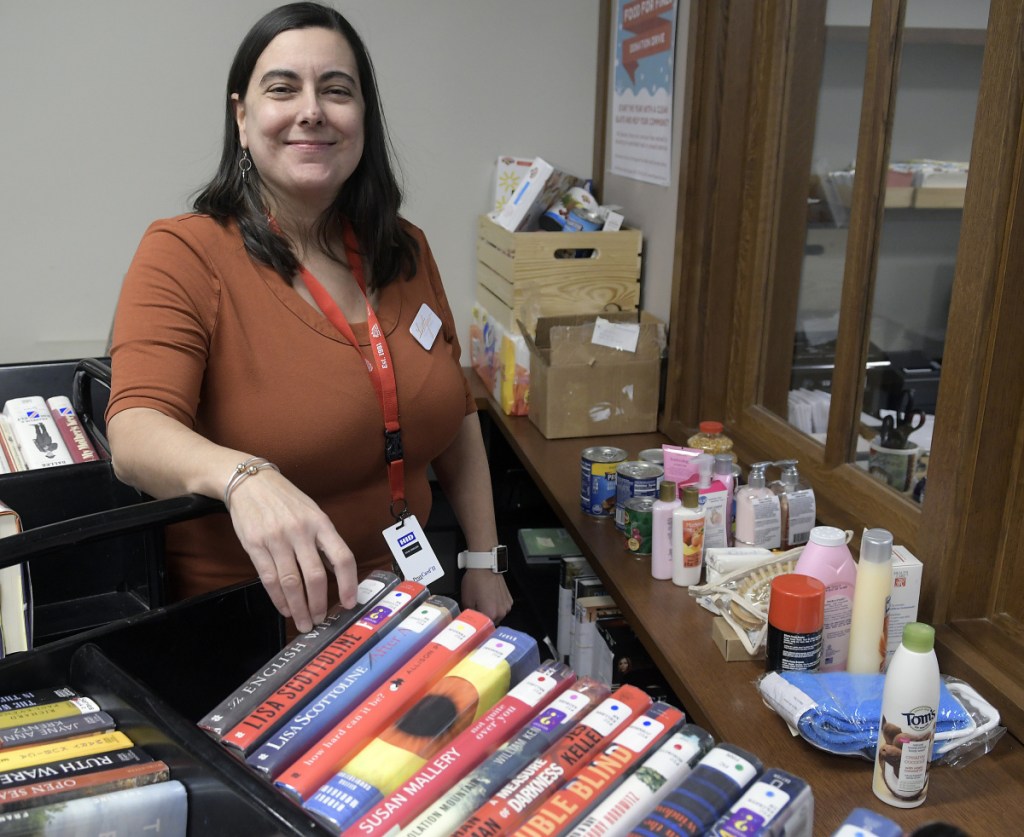AUGUSTA — For the rest of this month, people with overdue book fines at Lithgow Public Library can take care of them while helping others.
The Augusta library is running a “Food for Fines” donation drive through January, collecting nonperishable food items for the Augusta Food Bank and toiletry items for the Everyday Essentials Basics Pantry. People who bring in donations will have their fines wiped away — and help people in need.
Sarah Schultz-Nielsen, Lithgow’s director and youth services librarian, said the library has run fine forgiveness donation drives before, but “it’s been a long time since we’ve done it.”
She noted it has taken place at different times throughout the year, including before the holidays.
“It’s a way for people to clear any fines, so they can borrow again — or at least clear their conscience,” said Schultz-Nielsen. “I like doing it in January. People are often focused on doing things (like this) during the holidays, but afterwards there is such a letdown.
“Doing it at the beginning of the year, it also brings things back to square one,” she added.
Lithgow Public Library, located at 45 Winthrop St. in Augusta, has conducted drives to benefit the food bank before, but this is the first time it has included donations for the Everyday Essentials Basics Pantry.
“This year we’re also accepting things for the Essentials Pantry in addition to canned goods,” said Schultz-Nielsen. “It’s just another need in the community that we’ve seen.”
Sarah Miller, director of Bridging the Gap, which runs the Everyday Essentials Basics Pantry, said the idea to include her organization came from the library.
“We were very grateful that they wanted to include us and our services in that drive,” she said. “People get their fines waived if they bring in toilet paper or shampoo, that to us is a win-win-win.
“We’re a big supporter of a public library and how they’re supporting the community,” Miller added. “It’s a wonderful sort of tag team partnership, and we’re grateful they’re doing this drive to support us.”
Though the library is including the Pantry for the first time, Miller said other groups have pitched in to support its efforts before.
“We’ve had multiple groups help through drives, or certain groups such as sororities do a collection amongst themselves,” she said. “There are many groups, both large and small, that have done drives.
“It’s amazing,” Miller added, “because we could not do what we do in our small corner of the world if we did not have the support of the community.”
And there is a need for the Pantry, as evidenced by the number of orders — a list of items requested by an individual — that are being filled. In December 2018, a total of 1,110 orders were packed; in December 2017, there were 762 orders packed.
“So our numbers are way up this year,” Miller said. “Overall, from 2017 to 2018, we’ve seen a 21 percent increase.”
She attributes at least some of that growth to the Pantry’s new location — 209 Eastern Ave. in Augusta — and expanded hours.
“We’ve expanded our hours, and that is one of the reasons (for the increased use),” Miller said. “Basics was originally open just on the weekend and that was a barrier for some of the individuals because the KVCAP bus doesn’t run on weekends. We’ve expanded it to Tuesdays and Thursdays during the week.”
While she didn’t know if there is a greater need, Miller said with the new location and hours, “perhaps we’re better able to fulfill a need that is out there.”
“We’ve had a little more publicity because of our location,” she said, “so people may be more familiar with what we do offer.”
The “Food for Fines” drive will run through the end of the month, at which time the donated items will be delivered to the organizations.
While any non-perishable food item or unopened toiletry will be accepted, there are some things that are especially needed. For the Everyday Essentials Basics Pantry, most needed is toilet paper, powdered laundry detergent, full-size bottles of shampoo, full-size bar soap, toothpaste and toothbrushes for adults and children, diapers (size 4-6), diaper wipes, tampons, and sanitary pads (regular and super). The Augusta Food Bank can use large quantities — as opposed to many smaller packages — of peanut butter, baked beans, juice boxes and canned fruit the most.
With about half the month to go, Schultz-Nielsen is only able to provide anecdotal evidence about the donation drive’s success.
“It’s been going great,” she said. “At the end of it, we’re going to try to weigh the amount of food we got to quantify how many pounds were donated.
“We’re trying to get the word out,” she added. “We’ll know more (about how successful it was) the first of February.”
“We have a policy that when people hit a certain threshold (of fines), they can’t borrow again until that is paid,” said Schultz-Nielsen. “With this, people are paying it forward. We plan to continue to do this as an annual thing.”
The only catch — food or essentials donations will only wipe out fines, not bills issued for things such as materials replacement.
“We’re accepting items for fines, not for tangible items,” said Schultz-Nielsen.
In forgiving the fines, there will be some impact to the library’s revenue line, Schultz-Nielsen said, but it will be minimal.
“It’s a revenue source for us that goes, because we’re a city department, back to the city to support our work,” she said, noting that she couldn’t say how much the donations for fines program would impact revenue. “It’s hard to quantify. It won’t put a dent in the revenue — it’s more of a goodwill thing.”
Schultz-Nielsen said that some people may consider a 50 cent fine a “drop in the bucket,” but for others it is a hurdle that can be difficult to get over.
“For some folks it’s really hard to take care of that and it prevents access,” she said. “Although, part of being a good library citizen — for Augusta residents it’s part of their tax dollars, and those who don’t live in Augusta pay a fee — is being responsible” and bringing materials back.
In 2018, Lithgow collected a little more than $5,000 in overdue fines, Schultz-Nielsen said, a number that seems to grow each year. She noted that in 2017, a little more than $4,000 was generated in overdue fines and, though it’s early, this year is already trending to surpass the $5,000 threshold in fines.
“We would love people to come in that haven’t,” said Schultz-Nielsen. “Don’t feel guilty.”
Rob Montana — 621-5725
Twitter: @rjmontana
Send questions/comments to the editors.




Success. Please wait for the page to reload. If the page does not reload within 5 seconds, please refresh the page.
Enter your email and password to access comments.
Hi, to comment on stories you must . This profile is in addition to your subscription and website login.
Already have a commenting profile? .
Invalid username/password.
Please check your email to confirm and complete your registration.
Only subscribers are eligible to post comments. Please subscribe or login first for digital access. Here’s why.
Use the form below to reset your password. When you've submitted your account email, we will send an email with a reset code.